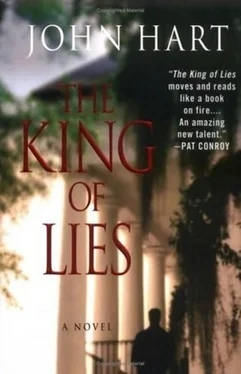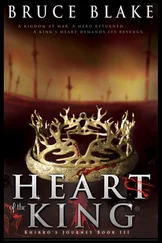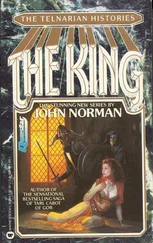“I object,” Douglas almost shouted.
The judge settled back into her chair and waved a narrow hand. “Approach,” she commanded. “Both of you.” At the bench, she looked down on us with the stern disapproval of a schoolmistress and used the same parchment hand to cover the microphone. Douglas opened his mouth to speak, but she rode him down with iron-shod words. “What is the problem here, Douglas? You’ve arrested him, charged him, and brought him before this Court. Do you honestly think that he’s a flight risk?… No? Neither do I. Now, I’ve seen your evidence, and between us, it’s got holes in it. But that’s your bailiwick, not mine. What’s mine is this decision.” She looked pointedly at my face, and I felt her eyes linger on the injuries. “You intend to rebut these charges, do you not, Mr. Pickens?”
“I do.”
“And you intend to do so in court. Is that not also true?”
“Yes.”
“So you’ll be here.”
“I wouldn’t miss it,” I said.
“There, Douglas,” the judge said. “He wouldn’t miss it.” I thought I heard teeth grind. “Now, we are off the record and speaking in private, and since I will not preside over the trial, I am going to say what I must.” She directed her next words at me. “I signed the warrant because I had no choice. On paper, probable cause to arrest did exist, and if I’d not signed it, some other judge would have.” She turned to the district attorney. “I don’t think he did it, Mr. DA, and if you quote me on that, I’ll deny it. But I’ve known this man for ten years, and I cannot believe he killed his father. I won’t. So you can stand up in this court and argue against bail. You can rant and rave. Your choice. But I’ll not have this man put back into the general population. That’s my discretion. My prerogative.”
I looked at Douglas, whose calcified features barely moved as he spoke. “It will stink of favoritism, Your Honor.”
“I’m sixty-nine years old, and have no plans to run for reelection. Do you think I give a damn? Now, step back. Both of you.”
My feet carried me back to the defense table, where I sat down. I risked a glance at Douglas, who was red-faced and studiously ignoring Detective Mills.
“Mr. Pickens,” the judge said. I came to my feet. “Do you have anything further you wish to offer the Court in support of your motion?”
“No, Your Honor.” I sat down, grateful to the judge for many things. Standing before this crowd to argue the reasons why I should be trusted outside of lockup would have been unpleasant at best. She had spared me that humiliation.
“Anything from the state?” she asked. If Douglas wanted to raise hell, he could. He could argue a great many points, many of which would make sense. He could make the judge look bad, and I hoped he would not do that. Slowly, he stood, his eyes on the tabletop, stretching the moment until it almost burst.
“The state requests only that bail be reasonable, Your Honor.”
Again, an excited stir ran through the packed courtroom, an energy wave that broke against my back before receding into yet another hushed expectancy.
“Bail is set at two hundred and fifty thousand dollars,” the judge said. “The defendant is bound over to superior court and remanded into custody until such time that bail is satisfied. This court will stand in recess for fifteen minutes.” Then she banged her gavel once and rose to her feet, looking small and withered inside the black robe of her office.
“All rise,” the bailiff thundered, and so I did, then watched in stillness as she slipped through the door behind her bench and the courtroom erupted into unabashed speculation.
I looked at Douglas, who had not moved. Muscles worked in his jaw as he stared at the door through which the judge had exited. Then his head swiveled, as if he felt me. He gestured to the bailiffs, and within seconds the cuffs were back on. Our eyes locked. Mills mouthed near-silent words into his ear, but he continued to ignore her. There was something in his eyes, and it was something unexpected. I knew this even though I could not recognize what it was. I knew only that it was not the normal look I’d seen him give other defendants. Then he surprised me by smiling. He stepped to my side, and his voice was like warm oil.
“I’d say that went rather well for you, Work.” Mills remained at the table, her face inscrutable. Behind us, several lawyers turned to watch, but none approached. We existed in a pocket of silence that seemed to belong to us alone. Even the bailiffs felt momentarily insubstantial. “You should be back on the street within a couple hours.”
I tried to pin him with my eyes, but in the orange coveralls and steel bracelets, I’d lost that power. His smile blossomed, as if he, too, had arrived at the same conclusion. “Why are you talking to me?” I asked.
“Because I can,” he replied.
“You’re a real ass, Douglas. I wonder how I’ve missed it all these years.”
His smile vanished. “You missed it because you wanted to miss it, like all defense lawyers. You want the deal. You want to be my buddy, so I’ll make your job easier. It’s a game and always has been. You know it as well as I do.” His eyes flicked left and right and he raised his voice ever so slightly. “But the game’s over, and I don’t have to play it anymore. So enjoy your little victory. The next judge won’t be so easy on you, and you can rest assured that I won’t be.”
Again, something felt odd, something in his eyes, maybe, something in what he said or how he said it. I tried to figure it out, when suddenly it became clear. Douglas was playing to the audience. Lawyers were watching, and Douglas was playing to them. I’d never seen him grandstand before. Looking at his face, sorting this out, a question occurred to me. I’d thought about it the night before, yet I had almost forgotten it. Before I’d considered my words, they were out, and their effect was immediate.
“Why did you let me go to the crime scene?” I asked.
Douglas looked uncomfortable. His eyes darted at the surrounding lawyers, then settled back on me. His voice dropped.
“What are you talking about?” he asked.
“The day they found his body, when I asked for permission to go to the crime scene. I didn’t think you’d agree; no reasonable district attorney would have. But you did. You almost ordered Mills to show me the body. Why did you do that?”
“You know why I let you go,” he said.
“For Jean.”
“For Jean. That’s right.”
A silence stretched in the wake of his words. For both of us, Jean had that power, which was probably the only thing that remained common to us both.
“It won’t help you as much as you think,” he said, referring to my presence at the crime scene. “I won’t allow it to.”
“Maybe it already has.”
“What’s that supposed to mean?”
“It means that a man has a lot of time to think in jail, Douglas. A whole lot of time.”
I was taunting him, and he finally realized it. But I’d scored a point; I’d made him doubt, if just for an instant. His face closed down like a carnival ride. The power just drained away, leaving everything still. For an instant, we had an eye thing going, the kind of unspoken communication I’d only had once or twice in my life. It was not so much a message as a feeling, one of cold, the kind I’d expected to find in jail yet, strangely, had not. But like that cell, his eyes were empty, dark, and timeless. Then some unfathomable emotion twisted his mouth into a cruel smile, and with a nod to the bailiffs, he sent me away.
The next hours dragged, as I waited, perhaps in vain, for someone to bail me out. They’d given me a phone again, and I’d called the only person I could. But Barbara was not there, or she chose not to answer. So I left a message for my wife and waited to see if she would leave me to rot.
Читать дальше












